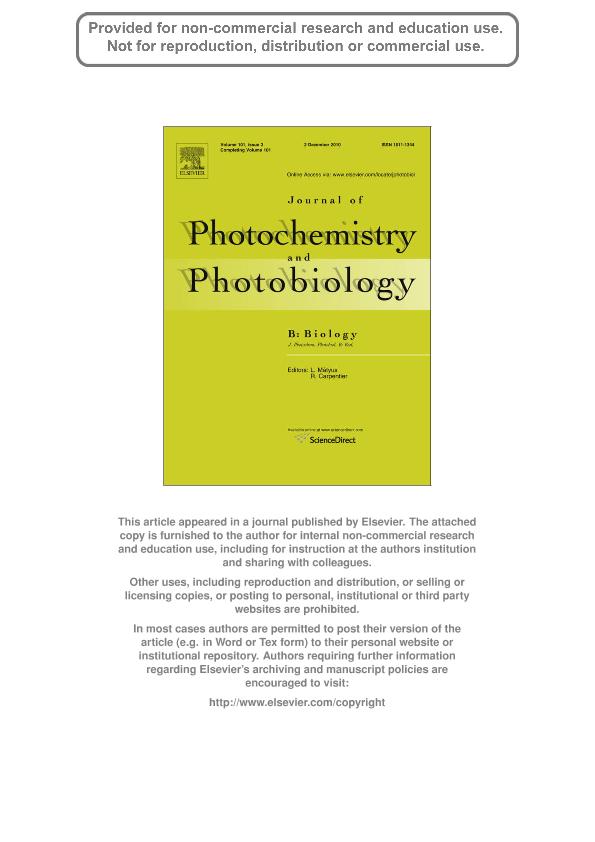Mostrar el registro sencillo del ítem
dc.contributor.author
Halac, Silvana Raquel

dc.contributor.author
Villafañe, Virginia Estela

dc.contributor.author
Helbling, Eduardo Walter

dc.date.available
2019-09-26T22:14:55Z
dc.date.issued
2010-12
dc.identifier.citation
Halac, Silvana Raquel; Villafañe, Virginia Estela; Helbling, Eduardo Walter; Temperature benefits the photosynthetic performance of the diatoms Chaetoceros gracilis and Thalassiosira weissflogii when exposed to UVR; Elsevier Science Sa; Journal of Photochemistry and Photobiology B: Biology; 101; 3; 12-2010; 196-205
dc.identifier.issn
1011-1344
dc.identifier.uri
http://hdl.handle.net/11336/84636
dc.description.abstract
The aim of this study was to assess the combined effects of temperature and UVR on the photosynthesis performance of two diatoms - Chaetoceros gracilis and Thalassiosira weissflogii. In particular, we evaluated the role of UVR in inducing photoinhibition and the potential mitigation of this negative effect by an increase in temperature. Cultures were pre-acclimated at two temperatures - 18 °C and 23 °C - and exposed to different radiation treatments - UVR. +. PAR (280-700 nm); UV-A. +. PAR (315-700 nm) and PAR only (400-700 nm) under two temperatures: 18 °C (local surface summer water temperature) and 23 °C (simulating a potential increase estimated by the year 2100). Exposure to natural solar radiation resulted in UVR-induced photoinhibition that was significantly higher in T. weissflogii than in C. gracilis. Both species benefited from the higher temperature (23 °C) resulting in a lower photoinhibition as compared to samples exposed at 18 °C. Inter-specific differences were determined in regard to the heat dissipation processes (NPQ) which were higher at high temperatures, and much more evident in C. gracilis than in T. weissflogii. The analyses of inhibition and recovery rates under different irradiances indicate that the balance between negative (inhibition) and positive (repair-dissipation) effects shifted towards a more positive balance with increasing temperature. Our results highlight for a beneficial effect of temperature on photosynthesis performance during exposure to UVR, although important inter-specific differences are found, probably due to differences in cell size as well as in their distribution within the oceanic realm (i.e., coastal versus oceanic species).
dc.format
application/pdf
dc.language.iso
eng
dc.publisher
Elsevier Science Sa

dc.rights
info:eu-repo/semantics/openAccess
dc.rights.uri
https://creativecommons.org/licenses/by-nc-sa/2.5/ar/
dc.subject
CHAETOCEROS GRACILIS
dc.subject
PATAGONIA
dc.subject
PHOTOSYNTHESIS
dc.subject
TEMPERATURE
dc.subject
THALASSIOSIRA WEISSFLOGII
dc.subject
UVR
dc.subject.classification
Biología Marina, Limnología

dc.subject.classification
Ciencias Biológicas

dc.subject.classification
CIENCIAS NATURALES Y EXACTAS

dc.title
Temperature benefits the photosynthetic performance of the diatoms Chaetoceros gracilis and Thalassiosira weissflogii when exposed to UVR
dc.type
info:eu-repo/semantics/article
dc.type
info:ar-repo/semantics/artículo
dc.type
info:eu-repo/semantics/publishedVersion
dc.date.updated
2019-09-20T15:11:14Z
dc.journal.volume
101
dc.journal.number
3
dc.journal.pagination
196-205
dc.journal.pais
Países Bajos

dc.journal.ciudad
Amsterdam
dc.description.fil
Fil: Halac, Silvana Raquel. Consejo Nacional de Investigaciones Científicas y Técnicas; Argentina. Secretaria de Ambiente y Desarrollo Sustentable de la Nación. Instituto Nacional del Agua y del Ambiente (Córdoba); Argentina. Fundación Playa Unión. Estación de Fotobiología Playa Unión; Argentina
dc.description.fil
Fil: Villafañe, Virginia Estela. Consejo Nacional de Investigaciones Científicas y Técnicas; Argentina. Fundación Playa Unión. Estación de Fotobiología Playa Unión; Argentina
dc.description.fil
Fil: Helbling, Eduardo Walter. Consejo Nacional de Investigaciones Científicas y Técnicas; Argentina. Fundación Playa Unión. Estación de Fotobiología Playa Unión; Argentina
dc.journal.title
Journal of Photochemistry and Photobiology B: Biology

dc.relation.alternativeid
info:eu-repo/semantics/altIdentifier/doi/https://doi.org/10.1016/j.jphotobiol.2010.07.003
dc.relation.alternativeid
info:eu-repo/semantics/altIdentifier/url/https://www.sciencedirect.com/science/article/pii/S1011134410001703
Archivos asociados
